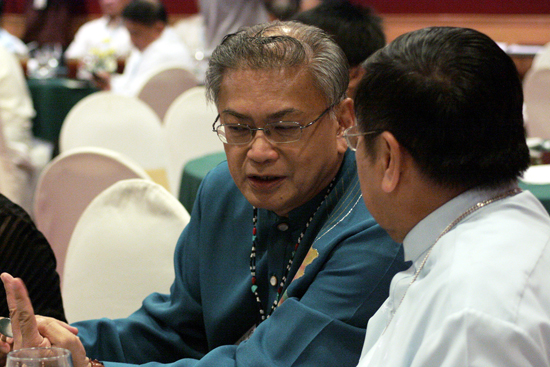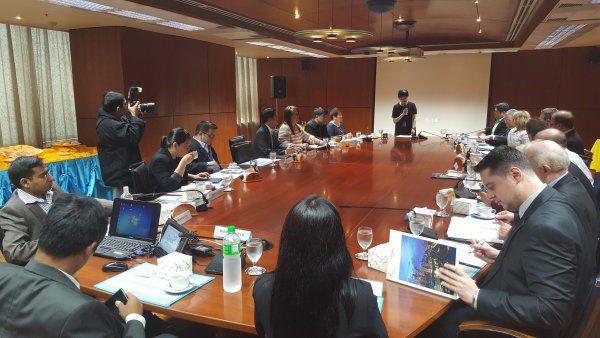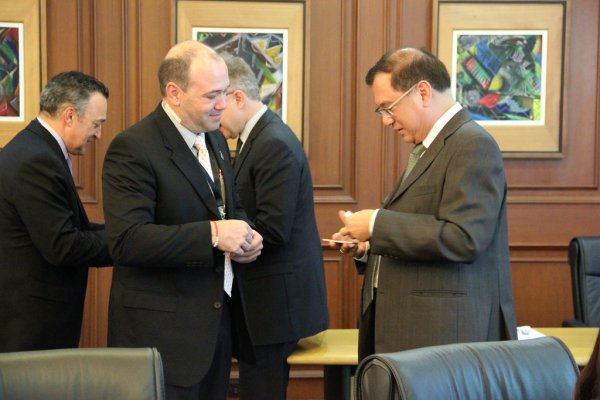Business Culture: Business Meetings
Graciousness in getting to know your counterparts is interpreted as a sign of respect, and will result in productive meetings. Prior to interacting with your counterparts, it is wise to determine the kind of business culture you are likely to experience. Cultural influences in the Philippines are diverse, and you may find a different pace to meetings among Western-oriented businesspeople than among Asian-oriented businesspeople. Prior to your meeting, you should provide an agenda, and request a list of your host’s team; choose your own team to match their ranks and responsibilities. During introductions, maintain eye contact. Business attire is formal and conservative, and should make an impression.
Preparation
Because business is conducted on a personal level in the Philippines, it is advisable for you to find a local contact person who can guide you to the right people in the companies you are most interested in. You can still make connections on your own without this assistance, but the process will take much longer and you will have to go through several intermediaries before you find the right person who is willing to meet with you. Your country’s embassy in the Philippines may have a commercial services division that specializes in helping businesspeople.
Generally, you can make appointments on reasonably short notice of a couple of weeks. The telecommunications infrastructure is sophisticated, with faxes, e-mail, and cell phones all readily available. In fact, if time is of the essence, it’s fairly easy to set up a meeting shortly before you arrive in the Philippines. English is universally spoken, generally with good fluency; if it is your native language you will probably not need an interpreter.
The official language is Tagalog, and if you want to impress your hosts you can try out a few common expressions.
| English | Tagalog |
|---|---|
| Hello | Hi |
| How are you? | Kumusta po kayo? |
| I'm fine, thanks. | Mabuti po naman |
| My name is ... | Ako po si ... |
| Please | Tuloy |
| Thank you | Salamat po |
| Yes | Opo |
| Goodbye | Paalam |
Scheduling
Punctuality is expected from both you and your hosts. Although meetings might not start on time, it is assumed that everyone will be present as per the schedule. The major cities of Manila and Quezon are heavily congested, and traffic on the way to the meeting may well be a problem. You must give yourself a lot of extra time. If you are late, phoning in advance is a common courtesy.
As residents of a Catholic country, Filipinos celebrate Easter and Christmas over several-week periods during which very little business is scheduled. Workers, however, do not take their annual vacations at any special time of the year. Filipinos are not generally workaholics, so don’t plan on setting up meetings on the weekends or after 5p.m.
Meals are used both for socializing and light business-related conversation. A working lunch of one to two hours is common, and if a relationship is developing between the parties, there will definitely be a dinner invitation. It is rude to refuse any offer to share a meal.
Business Attire
Business dress in the Philippines is formal and conservative. Men should wear a dark suit and tie; women should wear a business outfit with a long skirt or slacks. Since it can get very hot in the Philippines, exceptions are often made for more casual attire, which will be signaled by your host.
Women are readily integrated in all levels of business activity (there have recently been two women presidents) and there should be no problems of gender discrimination. Filipinos do tend to judge people on their appearances, so dressing tastefully will make a better impression and reflect positively on your company.
Meeting Protocol
It is important to determine in advance the kind of business culture you will experience in your meetings. Older businesspeople with an Asian/Chinese background will show great respect for age and rank. On the other hand, younger, more Western-oriented technocrats will tend to respect expertise and intelligence. Often the leader of the company will not attend the first meeting, possibility waiting until an agreement is close. In the meantime, lower-ranking staff present and consider proposals and then pass their recommendations up the ladder for consideration.
Whenever possible you should submit a general agenda in advance with a detailed list of your team members and their positions. All the necessary materials should be contained in the professional-looking kits your team will hand out. An overview, with some emphasis on key points, is all that’s expected
Entering the Meeting Room: Hierarchy
You should ask for a list of your host’s team and match their rankings and responsibilities with your personnel as much as possible. If it appears that a high-ranking decision-maker is not going to be present, you should express your disappointment and ask for an explanation. Always have your senior person enter the room first.
Introductions
Greet each of your Filipino counterparts personally. Making and maintaining eye contact is important as a sign of your honesty and sincerity. A moderate handshake is expected from both men and women. There may be some additional physical contact, such as a pat on the back or a two-handed handshake. The custom of the handshake is repeated at the end of the meeting.
Filipinos tend to require the same amount of personal space as is common in Western cultures. You will need to maintain your distance, as crowding your counterparts will make them feel uncomfortable.
Forms of Address
Filipino professionals should be addressed by their occupational title—for example, Doctor or Professor. Everyone, regardless of their authority, should initially be addressed as Mister or Madame until you are certain that the use of a first name would be appropriate. It is common for a Filipino to say Mister or even Sir in front of a man’s first name. This may sound unfamiliar, but it is a sign of respect.
Business Cards
The common ritual of exchanging business cards is practiced with less formality in the Philippines. Not everyone has a business card, and often only the senior personnel will make the exchange. It is not necessary to print one side of your card in Tagalog. If you have any special qualification or senior position at your company, you should include this on your business card, as added rank will result in additional respect.
Body Language
Filipinos are very expressive in their gestures, with many hand movements and incidental physical touching. Humor is common, and you should feel free to respond in kind.
Meeting Starters: Small Talk versus Getting Down to Business
At the outset of the meeting, visitors are traditionally offered a cup of tea, coffee, and perhaps pastry. To go directly to the point indicates a lack of graciousness from a Filipino perspective. The preferred style is based on the principle that a meeting is a social occasion, and it is considered rude to refuse. Philippine society is a tobacco-smoking culture; however, most offices are smoke-free.
The Filipinos believe that they are meeting you as a person first and then deciding whether to do business with your company. As such you will need to spend some quality time developing a relationship before jumping into the details of the business deal. Because of their connection to their many countrymen who work around the world, often in service-related occupations, your hosts are generally knowledgeable about current affairs and you should find it easy to talk with them on a number of topics. The Philippines has a history of civil strife with various minority groups, so you should avoid discussing these sorts of internal political issues.
Conducting the Meeting
The pace of your meeting will depend on whether you are sitting with Asian- or Western-oriented businesspeople. Generally, the meetings will move along slower than you might prefer, but faster than those in countries with little Western influence. The Filipinos will interpret the tolerance you display as a sign of respect and a willingness to expend time on a worthy pursuit. Appearing impatient will invariably send the wrong signal, weakening your standing and, hence, your proposal.
Generally the slowness in deliberations is not a negotiating strategy, but actually an effort by your counterparts to understand and fully consider your proposals. But be careful not to appear too demanding, and be aware that Filipinos are leery of yabang (empty boasting). They’ll readily dismiss anyone who seems inordinately boastful. Don’t attempt to hurry things along, as usually both parties want negotiations to succeed. Above all, it would be considered extremely rude for you to ask your counterparts to move on and come to the point.
Decision Making
You’ll find that for the sake of group harmony and to reduce the possibilities of mistakes, the other team will make its ideas known primarily through one person. That person may or may not be the leader; the particular context should reveal this.
Although the most senior members of any business always make the final decisions, the process can take a long time in Philippines. Family-run businesses, of which there are many, may have to consult with several layers of both relatives and technicians. Even though the government has privatized most business fields, be prepared for government bureaucracy and involvement, which is a holdover from previous authoritarian leaders and their policies.
Gifts and Splitting the Bill
Presenting a gift is a nice gesture, but not an important requirement in doing business in the Philippines. If you have prepared something novel, you should give it, but in an informal manner. Avoid giving gifts that are too extravagant or personal, as that would be embarrassing.
The etiquette of Philippine hospitality is for the host to pay for the first meal. It is considered appropriate, however, for the visitor to reciprocate in a few days.
Follow-up
At the end of the meeting, don’t be surprised if few questions are raised, even though it may be quite clear that your counterparts have many. When they meet to consider and evaluate your proposal, they’ll decide by consensus which questions to ask at a later date.
Ask when you can expect to learn of a decision, but do so without seeming too assertive. In many cases, a mini-series of meetings will be held to further elaborate on the proposal. But once a decision has been made, the agreement will be binding.
Filipinos do not have an especially good reputation for follow-up on post-meeting details and deadlines. Make sure when you are done that you get the necessary contact information so that within a week or so you can start to make calls to find out what kind of progress is being made on implementation of the agreement. If you are unhappy with the execution, ask to talk to the most senior person with whom you have a relationship.
Copyright © 1993—2025 World Trade Press. All rights reserved.

 Philippines
Philippines 

